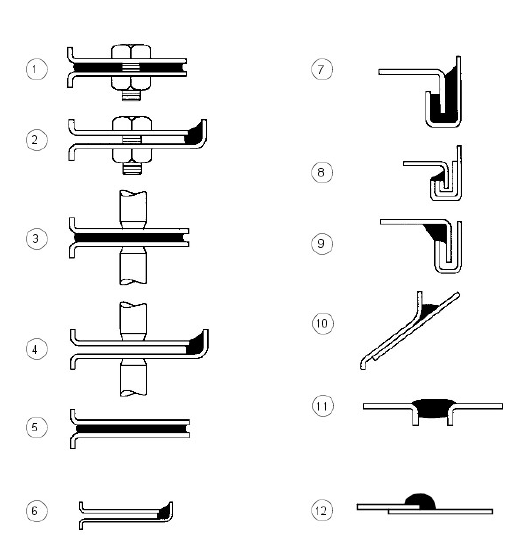Land Rover Discovery: Partial Renewal
The procedure to follow when partially renewing components is the same as described in the section "Welded Components".
The main difference when components are partially, rather than completely renewed, concerns the preparation of butt or lap joints.
- When bodywork components are cut through, attention must be paid to the adequate removal of the paint and zinc coatings on inner areas. This specially applies to areas which are difficult to access internally.
- It is important for the weld quality that the inner area is bare metal. Zinc and paint residues in the weld area burn and cause serious hole formation during welding.
- If the zinc layer and the paint coating are not removed, the zinc and paint will burn during welding. The soot produced prevents satisfactory cavity protection.
Procedure
- The paint layer must be removed for a width of 30 mm from the line of the weld using a rotating tress wire brush.
- This operation must be carried out on both the new and the old parts of the bodywork.
- Depending on the bodywork component, a 10 mm width of the underlying zinc layer must also be removed along the weld line.
NOTE:
A flat scraper or a wire brush can be used instead of the rotating brush if the cavity is small. Do not use an angle grinder, which would reduce panel integrity and may weaken the structure.
Application of Cavity Wax Protection on a Door Rocker Panel After Partial Repair
.67.jpg)
- Weld bead
- Spray head
- Distance maintainer
- Spray gun
Classification of the different corrosion protection measures for dent removal
.68.jpg)
Classification of Different Corrosion Protection Measures for Installation of New Components
.69.jpg)
.70.jpg)
BODY SEALING MATERIALS

- Between Panels - Bolted
- Panel Edge Bolted
- Between Panels - spot welded
- Panel edges - spot welded
- Between panels - bonded
- Panel edges - bonded
- Clinch joints - type A
- Clinch joints - type B
- Clinch joints - type C
- Gaps between panels - type A
- Gaps between panels - type B
- Lap joint
READ NEXT:
 Approved Service Materials for
Repair
Approved Service Materials for
Repair
If any of these items are not available check with the supplier/manufacturer
of these products for a superseded equivalent.
APPROVED SERVICE MATERIAL SUPPLIER - CONTACT DETAILS
3M
3M Uni
 Expanding Foam Acoustic
Seals
Expanding Foam Acoustic
Seals
Expanding foam acoustic seals are used in various closed-sections of the
body to improve vehicle refinement. The seals are installed during the
vehicle body manufacture and expand during the paint pro
 Body Closure Noise
Vibration and Harshness
Sealing
Body Closure Noise
Vibration and Harshness
Sealing
ACTIVATION
NOTE:
If the door is not supplied with the Noise Vibration and Harshness
(NVH) pad and seam sealant bead then follow this procedure.
Install a 400 mm x 180 mm Noise, Vibration and Harsh
SEE MORE:
 Rear Disc Brake Brake Caliper (G1785110) - Removal
Rear Disc Brake Brake Caliper (G1785110) - Removal
REMOVAL
CAUTION:
If brake fluid is spilt on the paintwork, the affected area must be
immediately washed down with cold water.
NOTE:
Removal steps in this procedure may contain installation details.
Connect the diagnostic tool and set the electronic park brake (EPB)
to the maintenance position.
NOTE:
 Headlamp courtesy delay
Headlamp courtesy delay
This feature operates whenever the
lighting control is in the auto position and
the ignition is switched off. The headlamps
will remain illuminated for up to 240
seconds.
Note: The time delay may be changed via
the Vehicle Set-Up menu.
The Courtesy delay can be switched off
at any time, by pressing
© 2019-2026 Copyright www.lrdisc.com

